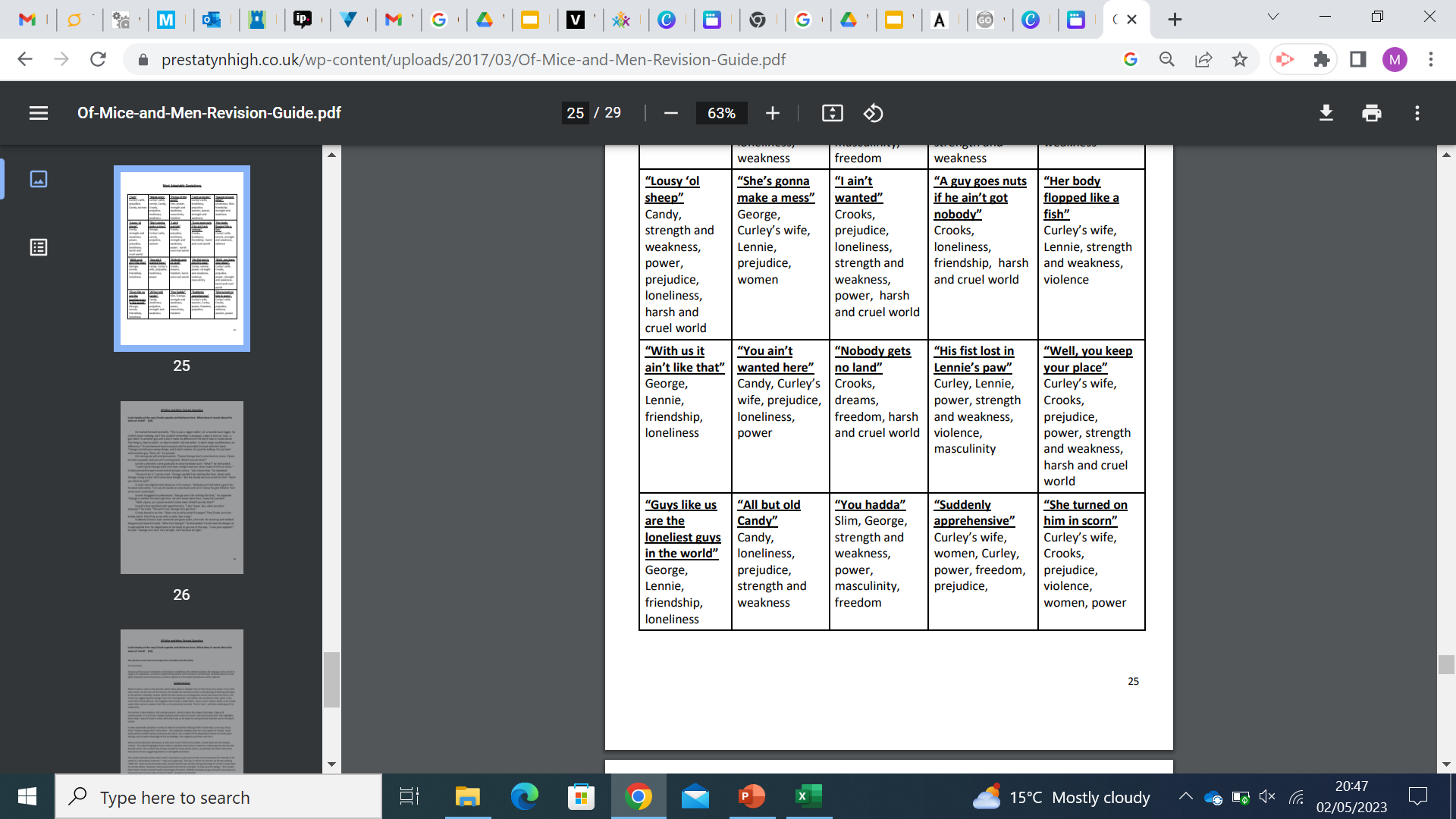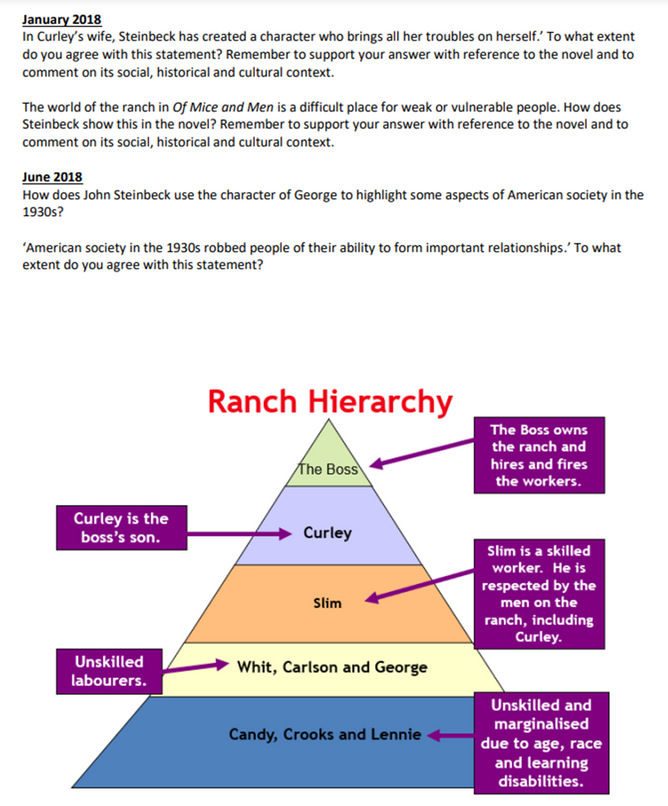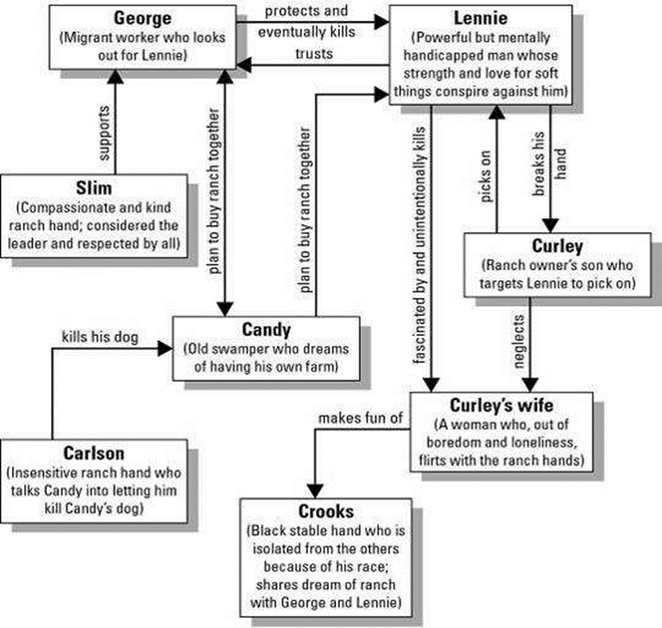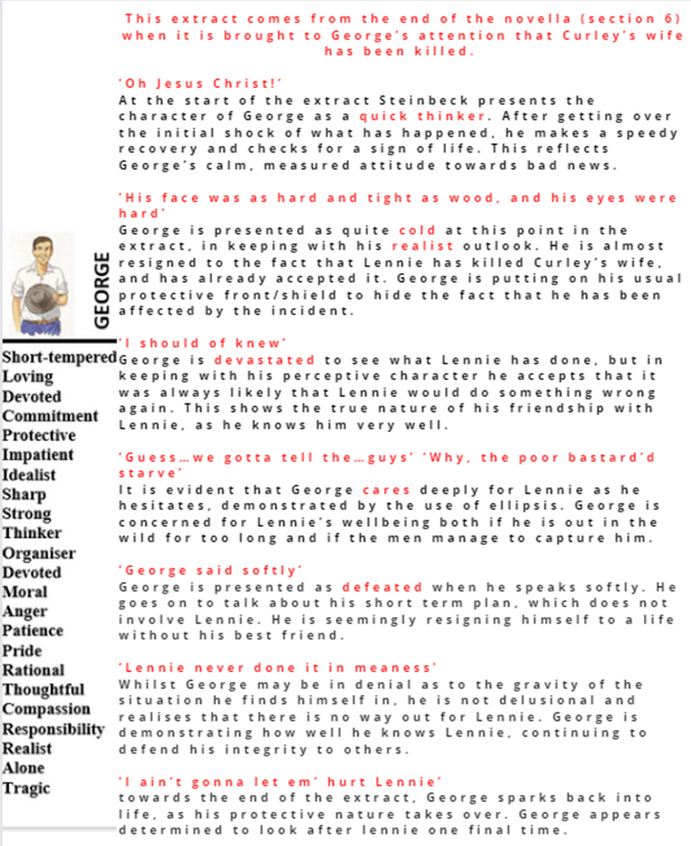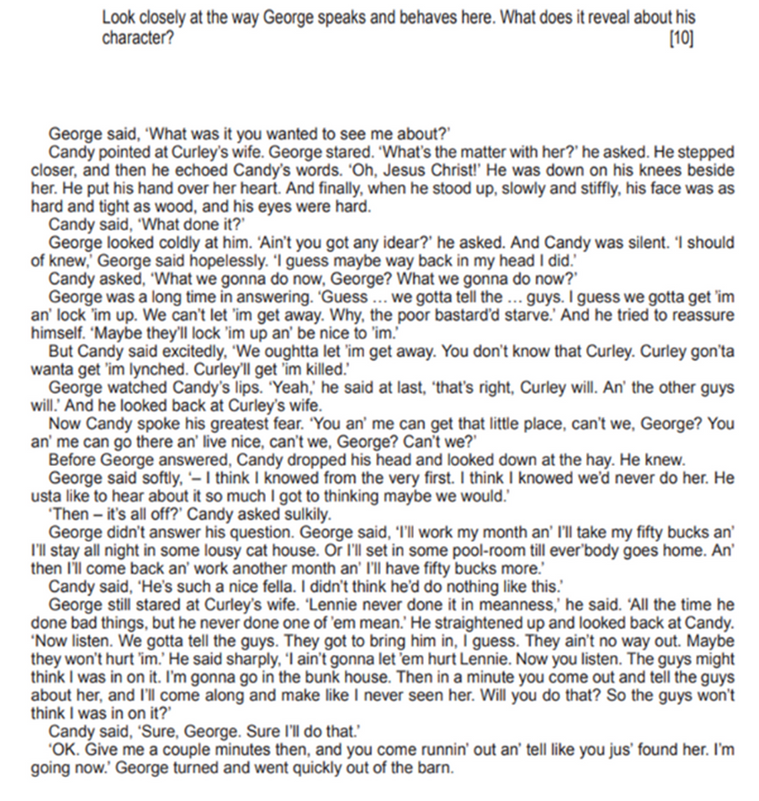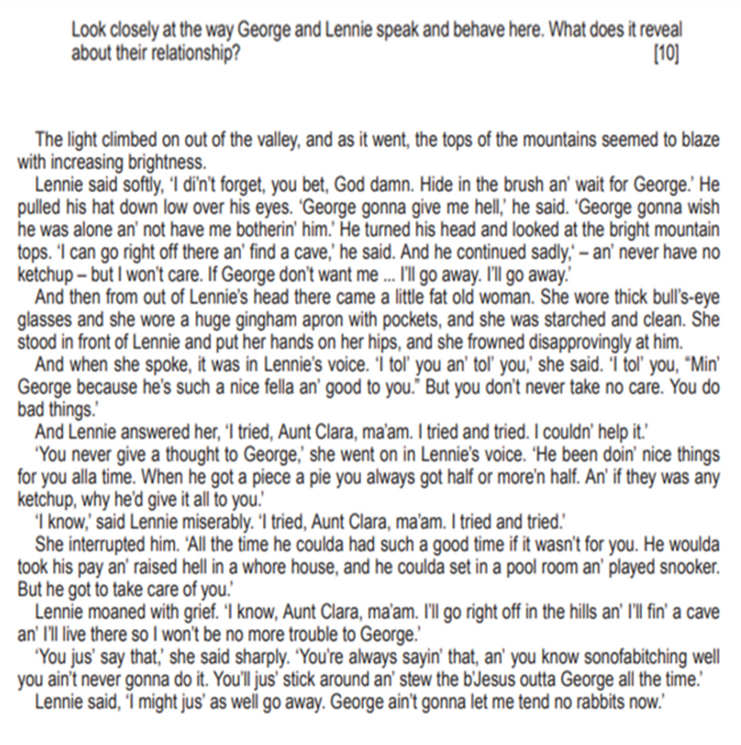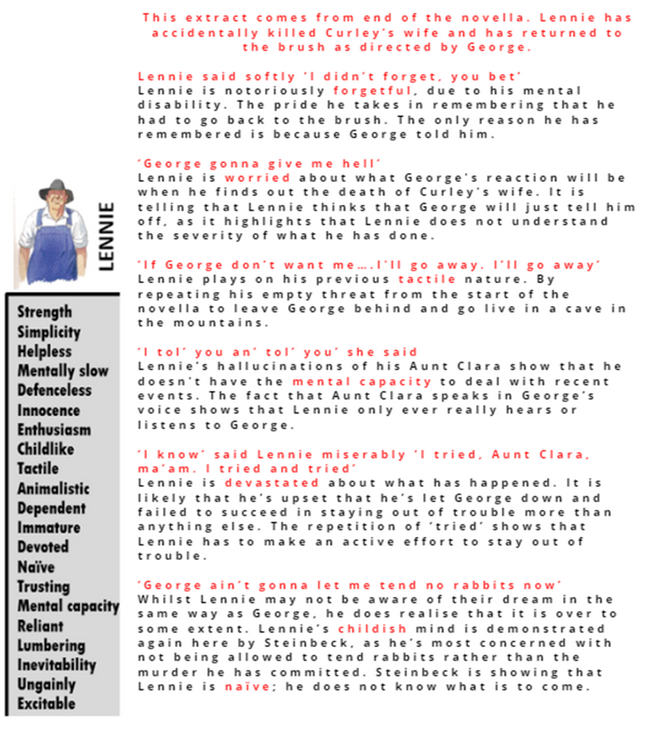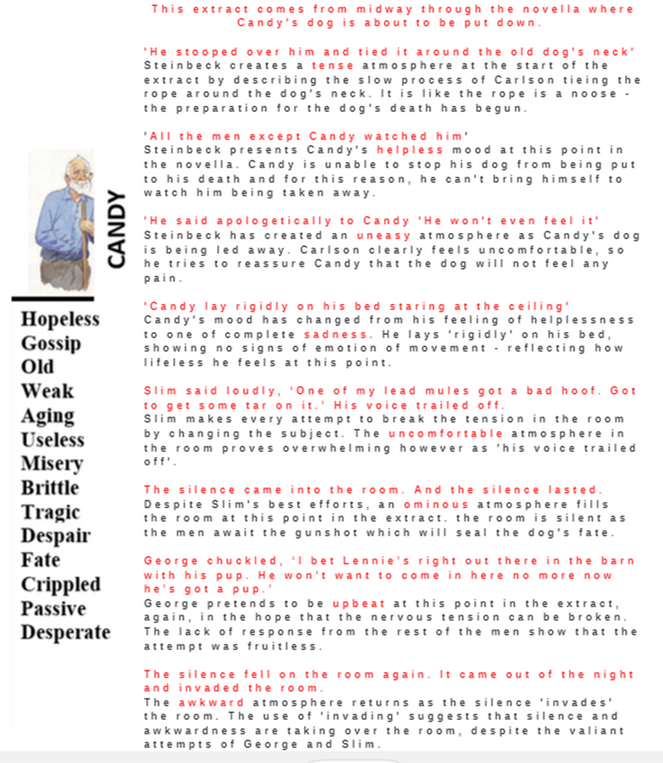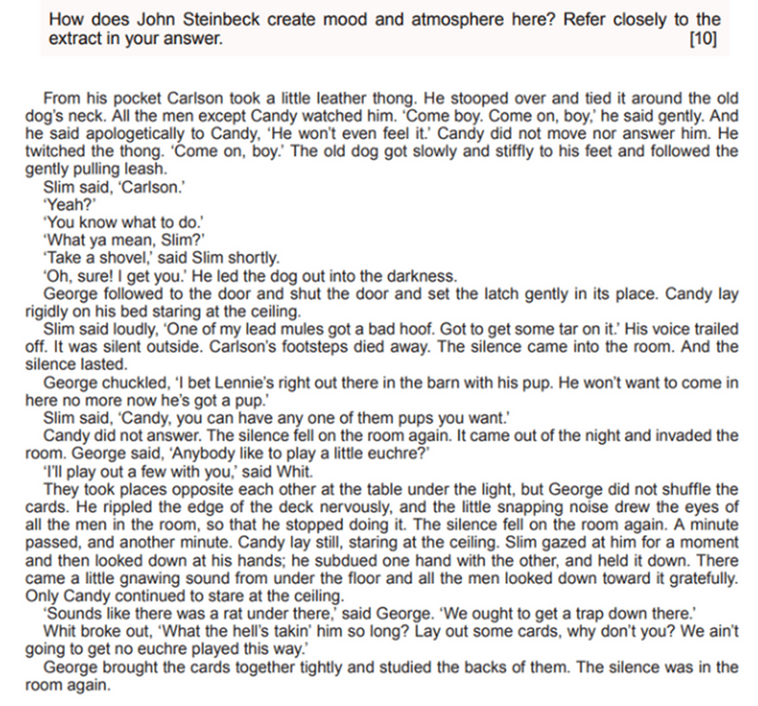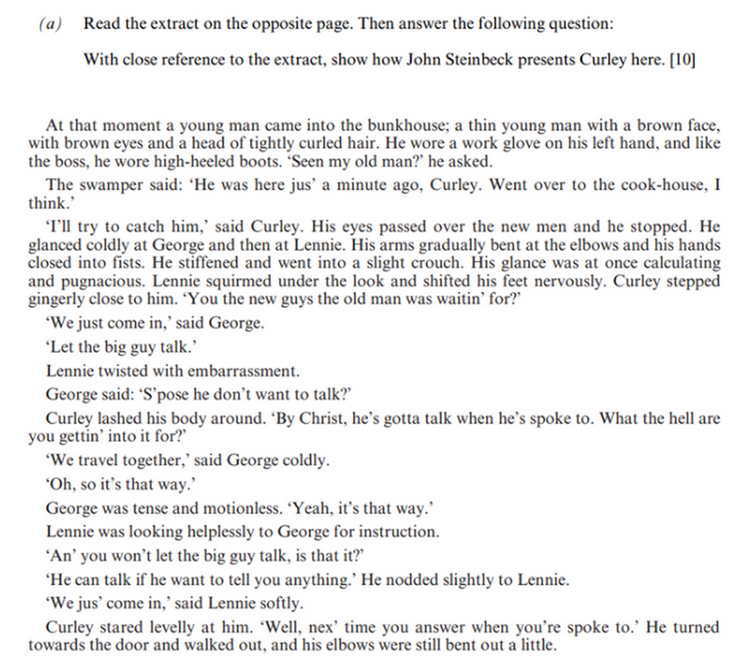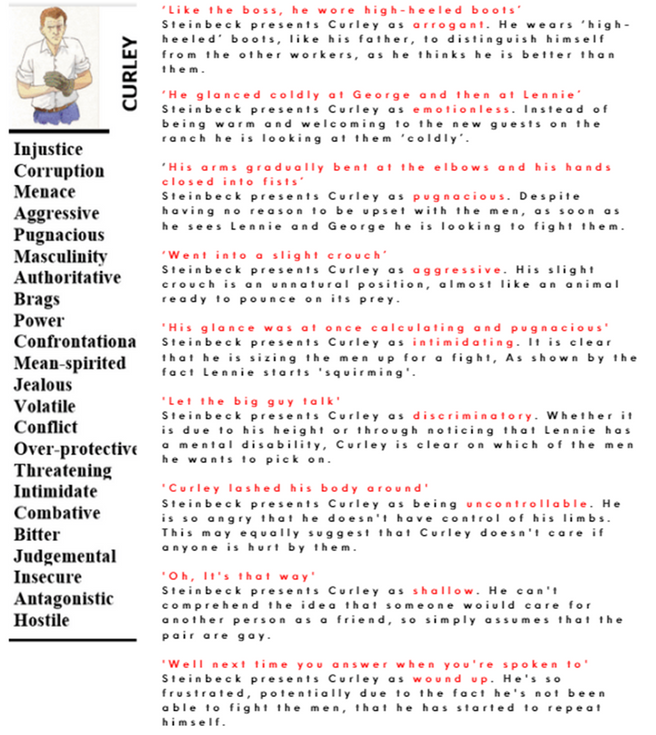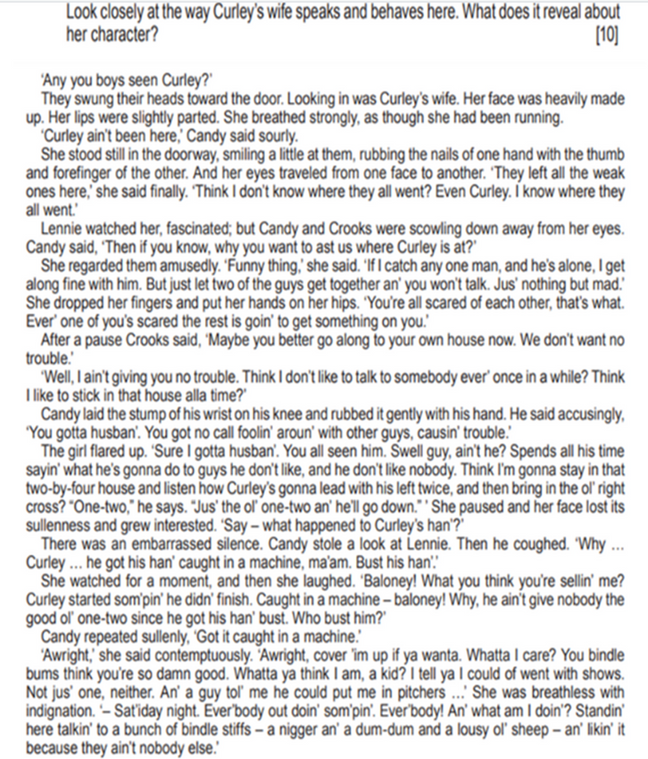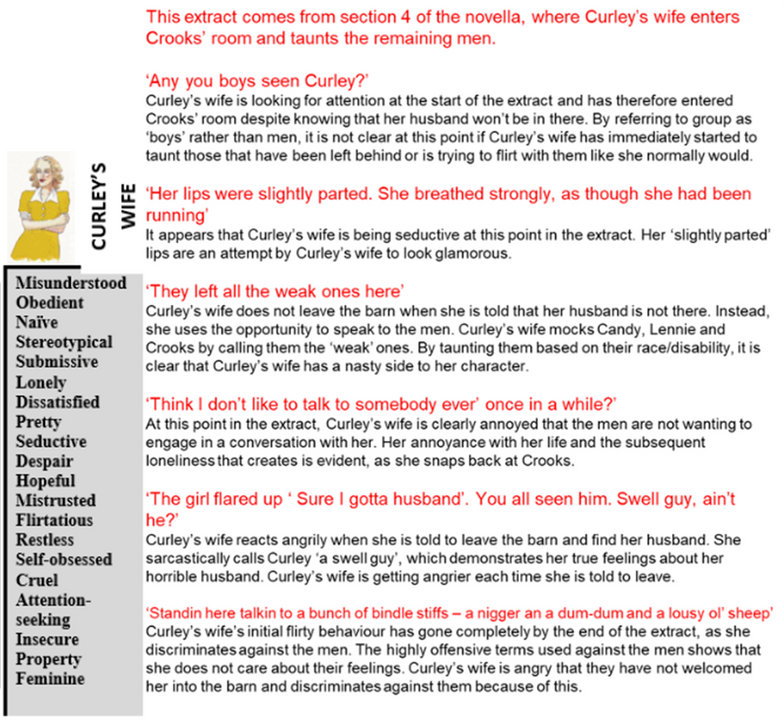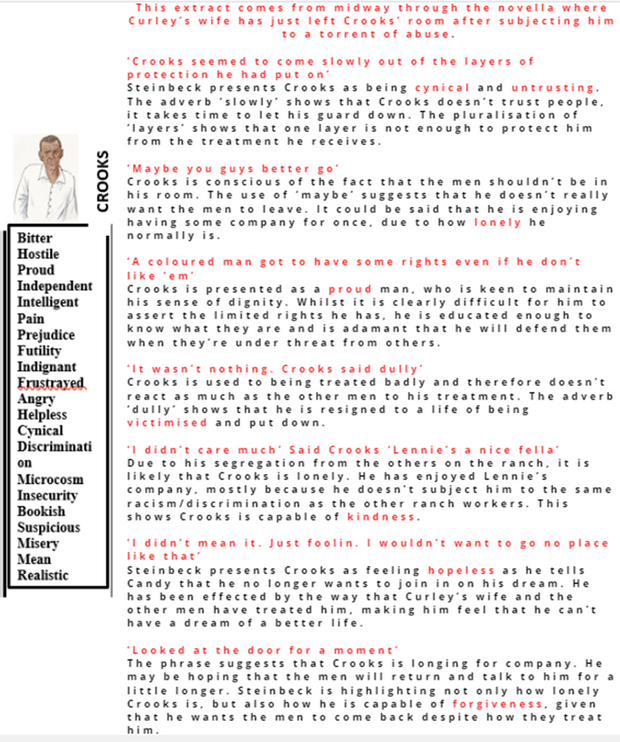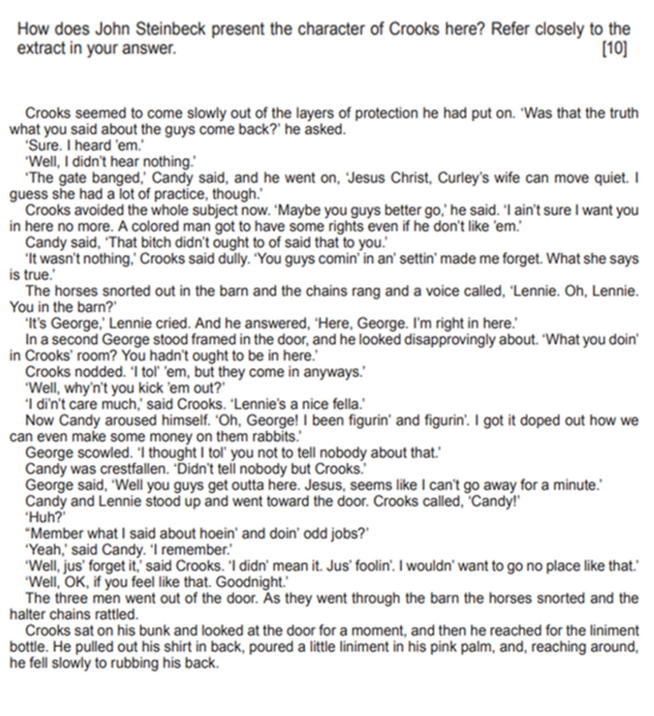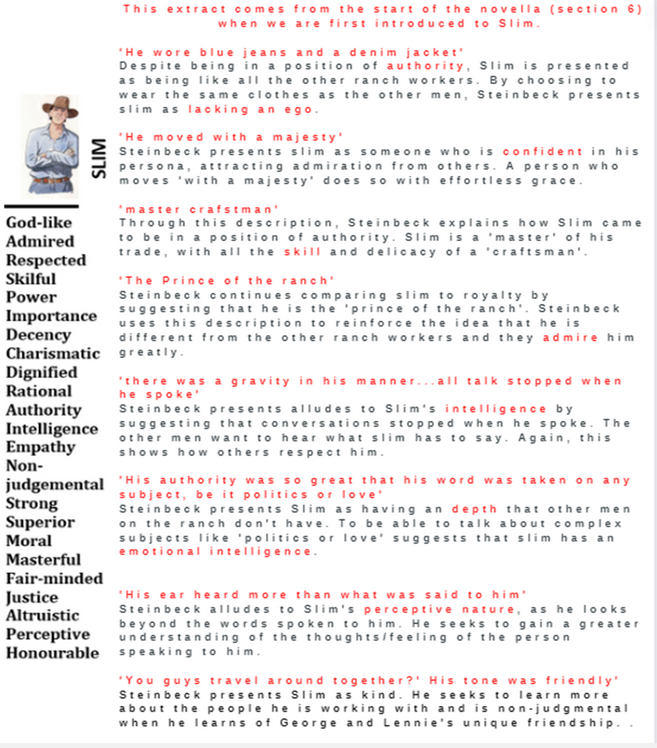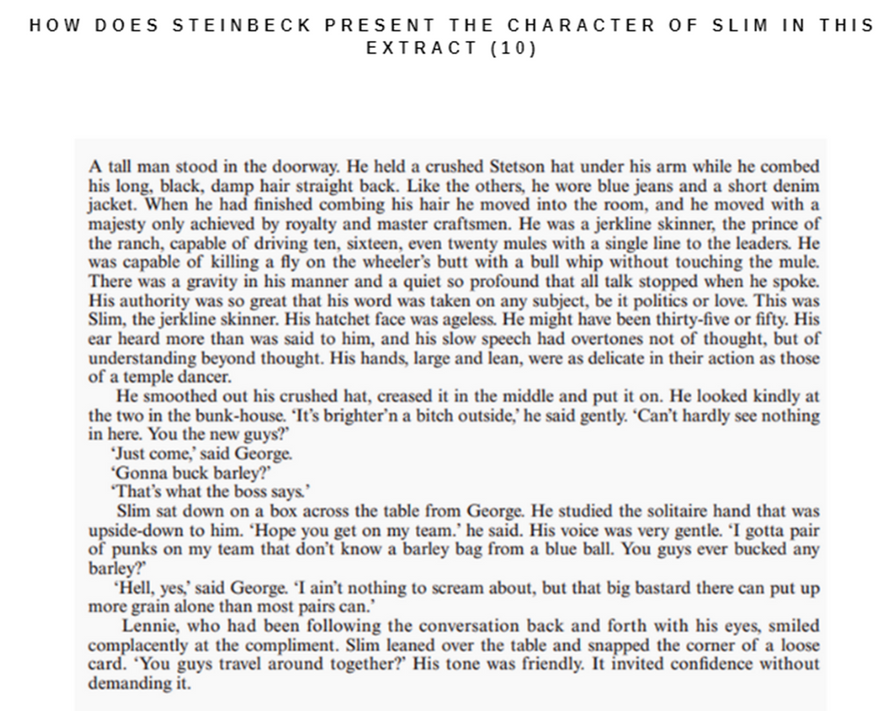Of Mice and Men
And unseen poetry
Revision website
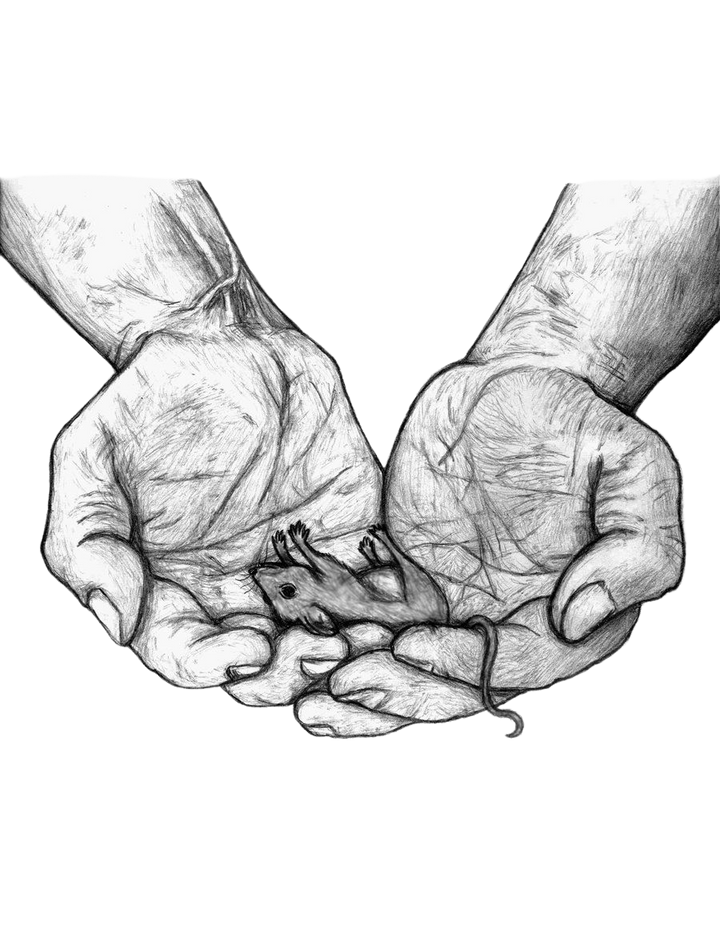
Adjectives to describe each character
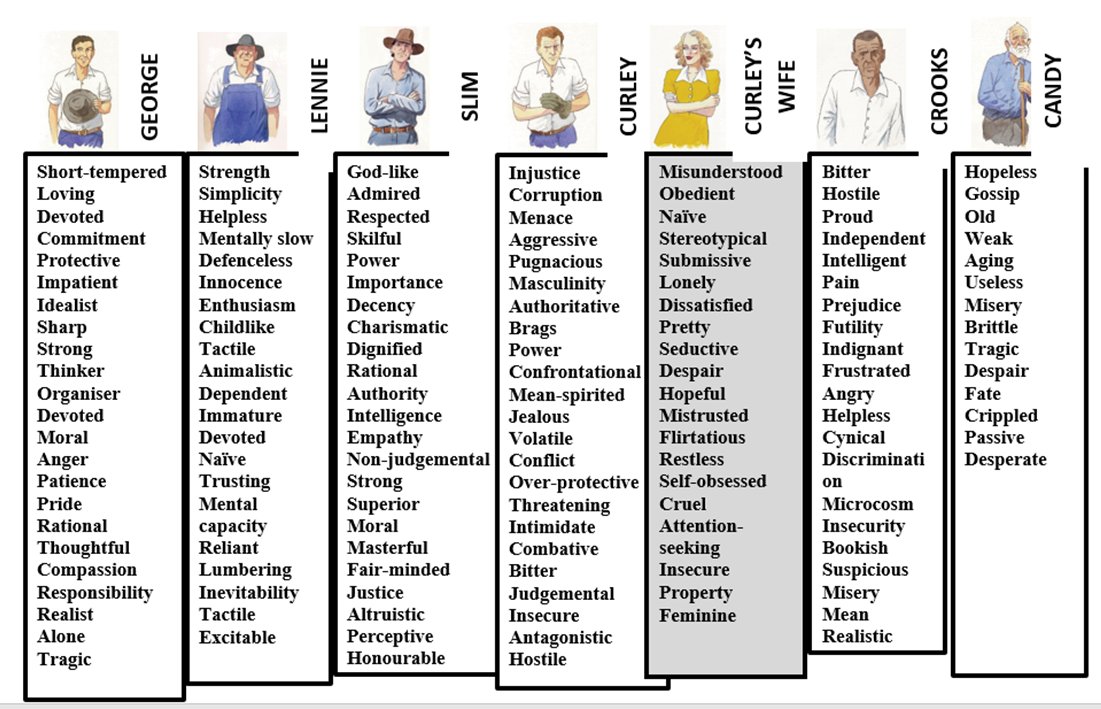
Character extract questions
Mood/atmosphere extract questions
Context
The American Dream
The American Dream is described as any goal can be achieved through hard work, courage and determination. This is the idea that in America, it is possible for anyone to achieve success and improve their lives through hard work alone.
James Truslow Adams, in his book The Epic of America, which was written in 1931, stated that the American dream is "that dream of a land in which life should be better and richer and fuller for everyone, with opportunity for each according to ability or achievement. It is not a dream of motor cars and high wages merely, but a dream of social order in which each man and each woman shall be able to attain to the fullest stature of which they are innately capable, and be recognized by others for what they are, regardless of the fortuitous circumstances of birth or position."
From the perspective of characters in OMAM, the American Dream is often very modest. George and Lennie acknowledge that on their ranch they would still have to work long hours, but they take comfort in not having a boss to answer to. For the men on the ranch in Of Mice and Men, having dreams gives them some hope that their hard work will be rewarded. Curley’s wife also has a dream – to be a film star – and although she no longer has any real hope that this could come true, it gives her a distraction from the unhappiness of her life, which is also true of dreams for the other characters.
Although dreams are initially a source of hope in the book, Lennie’s death makes his and George’s dream impossible so as the novel ends, we see that even simple, modest dreams are unattainable in the harsh environment of America during the Great Depression.
The Great Depression
The Great Depression took place following the Wall Street Crash in October 1929 and affected the world’s economy. The Wall Street Crash happened as a result of the following factors:
• Many normal Americans had started investing in the stock exchange and borrowing money to do so
• Stock prices rose unsustainably
• In October 1929, investors began to sell their shares en masse, with 12.9 million shares sold on Black Thursday (24th October 1929) and 16 million shares sold on Black Tuesday (29th October 1929)
There were other circumstances that contributed to the depression in the USA as well:
• Too many goods were being made and not enough were being bought
• Food prices were dropping, affecting farmers’ incomes
• There were too many small banks, which did not have the funds to manage when masses of customers withdrew savings in the autumn of 1929.
The Great Depression lasted for ten years worldwide, and for the USA it did not fully end until 1941 when the country became involved in World War Two. The depression got increasingly worse between 1929 and 1932. At the peak of the Great Depression, it is thought that between 13 million and 15 million people in the USA were unemployed. Industrial production in the country dropped by almost half and house building decreased by 80%. Many people across America suffered from poverty, hunger and disease as a result of the depression. Benefits that we are used to having access to today, like Jobseekers’ Allowance, did not exist in America at this time, so people who lost their jobs could also lose their homes and found it very difficult to buy food.
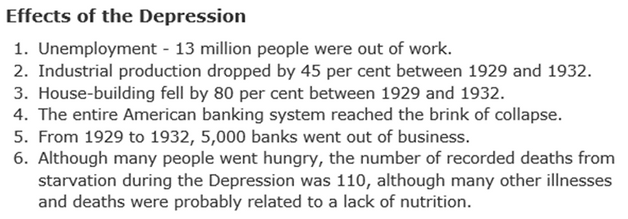
The Dust Bowl
During the years when there was adequate rainfall, the land produced bountiful crops. However, as a drought that started in the early 1930s persisted, the farmers kept ploughing and planting with increasingly dismal results. The rain simply stopped.
The primary impact area of the Dust Bowl, as it came to be known, was on the Southern Plains. The Northern Plains weren`t so badly affected, but the drought, dust, and agricultural decline were felt there as well. The agricultural devastation helped to lengthen the Great Depression, whose effects were felt worldwide.
One hundred million acres of the Southern Plains were turning into a wasteland of the Dust Bowl. In 1932, the national weather bureau reported 14 dust storms. The next year, they were up to 38. Dust blocked exterior doors; to get outside, people had to climb out their windows and shovel the dust away. Dust coated everything.
Nevertheless, farmers kept on ploughing, hopeful that the rains would return in a matter of days, or perhaps months. In the spring of 1934, the massive drought impacted 27 states severely and affected more than 75 percent of the country. The Dust Bowl was result of the worst drought in U.S. history.
Families survived on cornbread, beans, and milk. People were beginning to give up hope, and a mass exodus — the largest migration in American history — ensued from the plains. Many families packed their belongings, piled them on their cars and moved westward, fleeing the dust and desert of the Midwest for California. They were willing to work for any wage at all, planting and harvesting other people`s lands.
When those families reached the borders of those western states, they were not well received — too many people already there were out of work. Families often lived in tar-paper shacks with no floor or plumbing. By 1940, 2.5 million people had moved out of the Dust Bowl states toward the Pacific states.
In the spring of 1935, the wind blew 27 days and nights without stopping. People and animals began to die of suffocation and "dust pneumonia."
In the fall of 1939, after nearly a decade of dirt and dust, the skies finally opened. With the rain`s return, dry fields soon yielded their golden wheat once more, and just as quickly as it had begun, the Dust Bowl was, thankfully, over.
Key Themes
Dreams
Of Mice and Men by John Steinbeck is a poignant tale that explores the theme of the elusive nature of the American Dream during the Great Depression. The story chronicles the struggles of two itinerant workers, George and Lennie, who yearn to escape the squalor of their existence by owning a farm of their own. However, their dream is ultimately unattainable, and the harsh reality of their situation slowly dawns on George in particular.
The novel portrays the bleak and dehumanising fate of those who do not accept their lives as itinerant workers. George remarks to Slim that those who work alone on ranches become mean and joyless, reflecting the psychological toll of their impoverished existence. Furthermore, their idealised vision of the farm is a manifestation of their longing for a sense of purpose and control over their lives, an illusion that cannot be sustained in a world where human kindness and companionship is scarce.
The novel explores the complex interplay between the American Dream and the harsh realities of life during the Great Depression. Steinbeck highlights the ironic idea that maturity involves the destruction of one's dreams, and George's "maturation" is exemplified by his decision to kill Lennie to spare him a fate worse than death. By relinquishing his unrealistic aspirations, George accepts the stark truth that their dream is impractical and incompatible with the harsh realities of their existence.
Moreover, the book underscores the importance of friendship in the pursuit of the American Dream. The bond between George and Lennie is a rare and special one, born out of their shared experiences of hardship and adversity. The novel suggests that true friendship is essential to achieving one's goals, and that the camaraderie and mutual support that comes with it is crucial for sustaining hope and resilience.
Overall, Steinbeck's Of Mice and Men is a compelling exploration of the human condition, emphasizing the difficulties of realizing the American Dream in an unforgiving world, the importance of friendship in facing adversity, and the bittersweet nature of dreaming itself.
Loneliness
Loneliness is a recurrent theme in the novel. "Guys like us," George says, "that work on the ranches, are the loneliest guys in the world. They got no family. They don't belong no place." Lennie replies: "But not us. And why. Because ... because I got you to look after me, and you got me to look after you, and that's why." The alternative to the companionship that George and Lennie share is loneliness. George frequently affirms the fraternity between them. "He's my... cousin," George tells the ranch boss. "I told his old lady I'd take care of him” The boss is suspicious of the bond between George and Lennie, and the other characters in turn also question this friendship: they have simply never seen anything like it. In their world, isolation is the norm even Slim, who is usually sympathetic and understanding, expresses surprise. "Ain't many guys travel around together. I don't know why. Maybe ever' body in the whole damned world is scared of each other." Distrust is the quality of the modern world in which people live in alienation from one another.
Later, the theme of loneliness is further explored in the solitude borne by Crooks and Curley's wife, who dies as a result of seeking human companionship. Both these characters crave company and, as Curley's wife says, "someone to talk to."
Despite everyone's suspicion, the friendship between George and Lennie remains solid. In fact, Candy becomes part of their dream to buy the little farm, and later Crooks also expresses his desire to become part of the expanding fellowship. This is the high point of optimism in regard to the theme of overcoming loneliness in the modern world, when it seems most likely that alienation and loneliness will be overcome. After this point, however, the dream of fellowship on the farm begins to lose its promise, and at the moment that George and Candy discover the body of Curley's wife, they both realise that the dream is lost; their partnership dissolves. Actually, the dream was doomed from the start, because friendship cannot survive in a world ruled by loneliness, homelessness, and poverty.
This outcome also suggests that loneliness is an essential part of humanity's nature. This theme of loneliness has been implied from the beginning of the novel, when the author establishes the setting as "a few miles south of Soledad." Soledad is the name of a town in central California, but it is also the Spanish word for solitude. Yet Steinbeck's emphasis is on the greatness of his characters' attempt to live as brothers. Although the dream is doomed, the characters devote themselves to pursuing human fellowship.
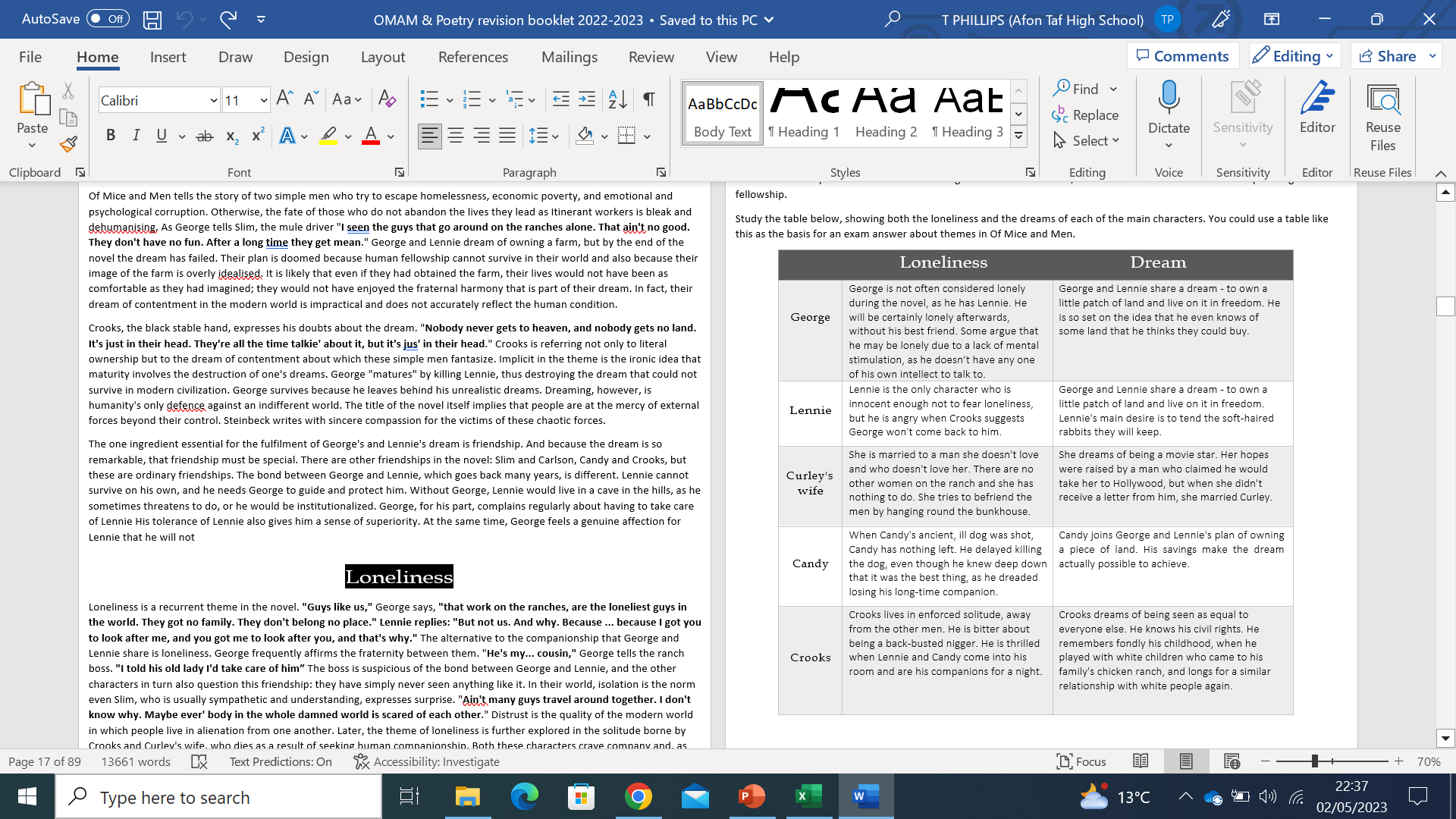
Discrimination
Somewhat related to the theme of loneliness is racism, which also results in personal isolation. Crooks, the old black man on the ranch, lives alone, ostracised by the ranch hands because of his race. The barrier of racial prejudice is briefly broken, however, when Crooks becomes an ally in the dream to buy a farm. Crooks has a bitter dignity and honesty that illustrate Steinbeck's own criticism of American society's failures in the Depression era of the 1930s.
Lennie's mental limitations also serve to illustrate another way in which people separate themselves from one another. Because of his handicap, Lennie is rejected by everyone at the ranch except George. The ranch hands are suspicious of Lennie and fear him when they recognise his physical strength and his inability to control himself. For example, when Crooks maliciously teases Lennie that George might decide to abandon his friend and that Lennie would then end up in "the booby hatch," Lennie becomes enraged. Eventually, Crooks backs off in fear of what Lennie could do to hurt him. Despite Lennie's potential for hurting people, however, Steinbeck makes it clear that it is the malice, fear, and anger in other people that are to blame for Lennie's violent actions (Crooks torments Lennie out of his own frustration for being rejected because he is black). When Curly starts to hit Lennie for supposedly laughing at him, Lennie at first retreats and allows his face to become bloodied until George tells him he should fight back; and when Lennie accidentally kills Curley's wife, it is a direct result of her inappropriate advances toward him. Steinbeck's portrayal of Lennie's handicap is therefore completely sympathetic; the other characters have only themselves to blame for provoking Lennie, who is merely a child in a world of selfish adults. That Lennie has to die at the novel's conclusion is a poignant commentary on the inability of the innocent to survive in modem society.
When Lennie and George get to the ranch they were hired to work on, they meet a woman. George and Lennie know her as Curley’s wife, and not by her true name. She is shown as an object to the men on the ranch. By doing this, Steinbeck starts to show how bad it will be for Curley’s wife to deal with everyday sexism. Curley’s wife shows that prejudice is not just towards race, but gender as well. An example of people being prejudice towards Curly’s wife is her name. No one knows what her real name is because she belongs as a possession to Curley. In the 1930s people believed that men were superior to women and that women were objects, not human beings. Her name proves, that she was not important because the migrant workers did not know her real name, instead they know that she is “owned” by Curly. Unfortunately, Curley’s wife is also an example of prejudice being a vicious, ongoing cycle. “Well, you keep your place then, n*gger. I could get you strung up on a tree so fast it ain’t even funny.” This shows Curley’s wife being prejudice towards Crooks, even though she was a victim of it herself. Curley’s wife is being mean to Crooks because he of his race, and she is being made fun of because she is a woman of possession that flirts with other men and does not truly love her husband, Curley.Being stuck in Curly’s house also makes Curly’s wife feel excluded among the men. “Think I don’t like to talk to somebody ever’ once in a while? Think I like to stick in that house alla time?” This shows that she not only wants to talk to people, but she also wants to be equal, or included, with all the other men on the ranch. When she says this, she is showing she is not allowed to talk to the men of the house and she believes it’s unfair. Curley’s wife just wants equal rights like all the other men on the farm.
Adaptable quotations
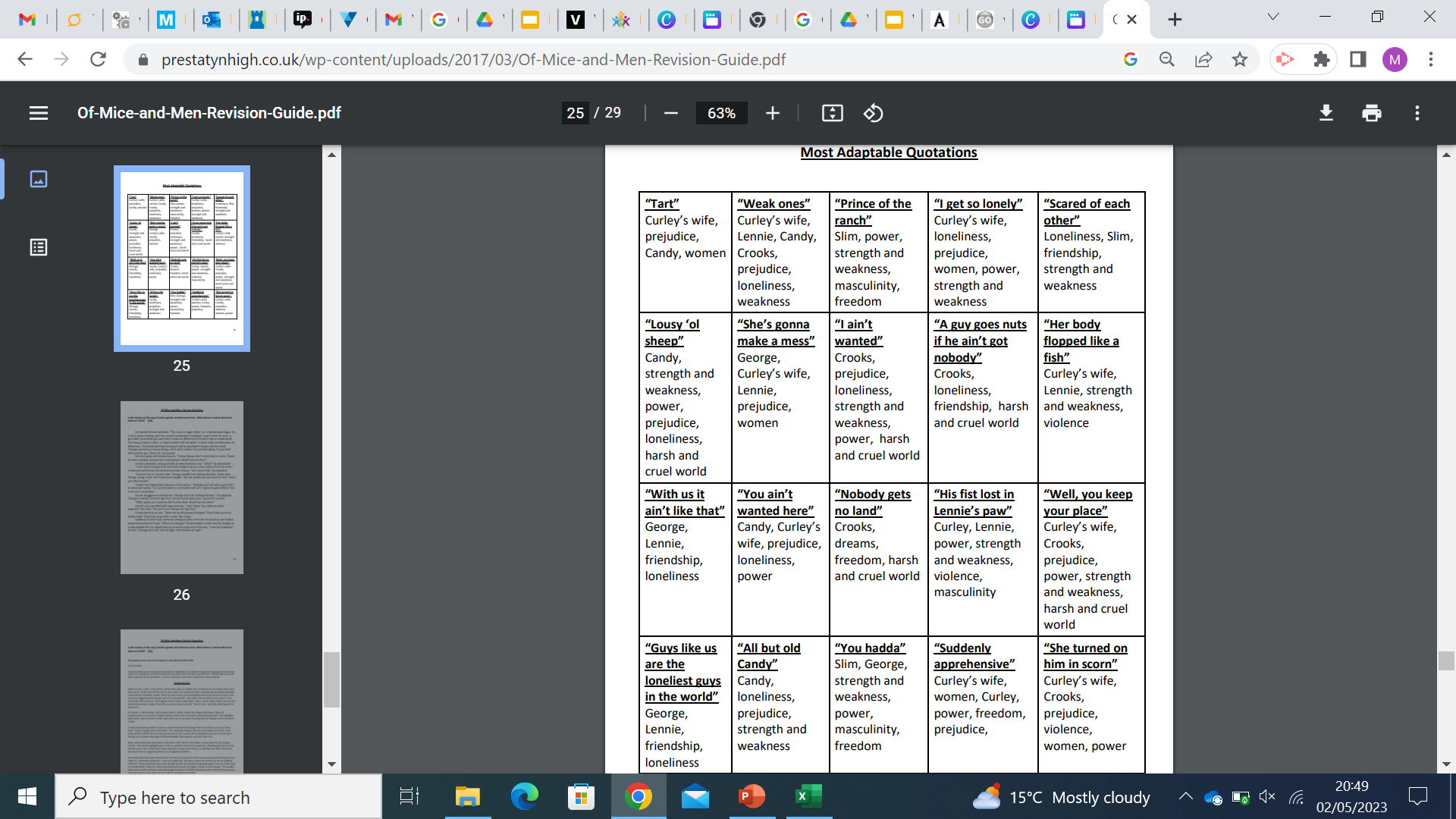
Adaptable quotations
